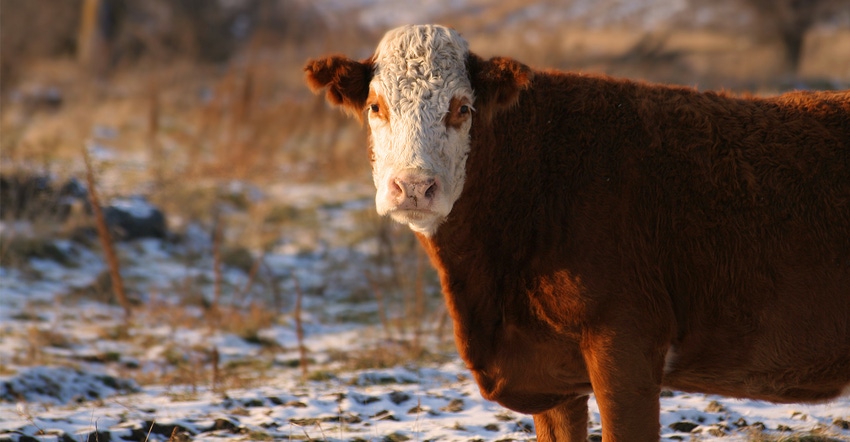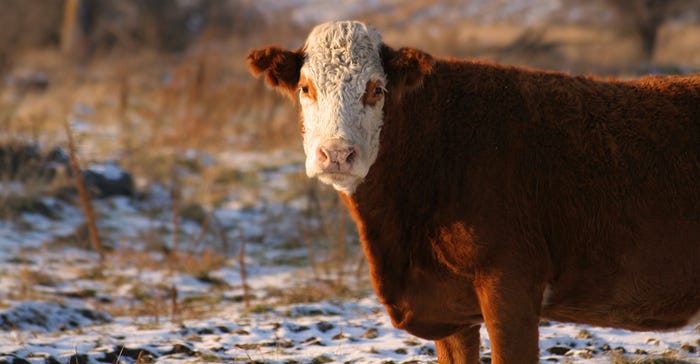Have you heard about vitamins lately?
Vitamins are significantly more expensive than they were just a few months ago. What’s the reason and how will that affect the way you feed your cattle? Controlling cost in any feed program is very important but be cautious of cutting the wrong inputs at the wrong time.
December 31, 2017

Sponsored Content
Has anyone noticed the increased cost of supplements and manufactured feeds lately? What's the reason? Vitamin costs. In beef cattle nutrition, it seems a lot of attention is given and information is reported, regarding the importance of nutrients like protein, macro and trace minerals, fats and carbohydrates (starch and sugar). Vitamins get attention as well and are about to get a lot more. Why? Simple, they are now a lot more expensive than they were just a few months ago. And not just a little higher, they are exponentially higher for some of the vitamins most commonly fed by cattle producers. The cause for the price increase is simple too- there's a shortage in supply. Overseas production has been limited due to manufacturing restrictions and disruptions. For our feed industry community, this issue is here to stay for the foreseeable near future.
Vitamins are important for overall nutritional status, affecting reproduction, immune function, health, and performance in beef cattle. Vitamin deficiency in cattle can be linked to weak calves, poor reproduction, muscle and skeletal issues, calving issues, etc. Water soluble vitamins, include C and the B-vitamins, and aren't focused upon too much in ruminants because rumen microflora can synthesize these, and thus the animal has its own supply. There are exceptions with some, as with thiamin that can be deactivated by antagonisms in the rumen such as sulfur. Feedstuffs and environmental sources with high levels of sulfur can aggravate this and in these cases supplemental B-vitamins are beneficial.
The fat-soluble vitamins include; A, D, E and K. Supplementation of these vitamins is more common, except for vitamin K, which is synthesized by rumen bacteria in sufficient quantities. Vitamins A, D, and E are commonly found in feed supplements, especially supplements that are more commonly used with low quality forages and fed in the fall and winter months. These vitamins are available in feedstuffs via precursors like Beta-Carotene that is converted to vitamin A in the body, and vitamin D is formed both in harvested forages and within the animal when exposed to ultraviolet light, i.e., sunlight. Season of the year and source of feedstuffs available will impact the amount of and availability of fat soluble vitamins to the animal. Requirements can and do vary based on diet, stage of production, age of animal, and previous plane of nutrition (as in the case of vitamin A that can be stored in the liver). In the past, it's been relatively easy and low cost to add synthetic vitamins to our supplements and rations to avoid deficiency, and performance responses to higher than maintenance levels have been beneficial as well.

Are we over-feeding vitamins?
In the coming months, a lot of questions may be raised as to how much and which vitamins to supplement. Perhaps not out of need but simply out of cost and availability. This topic is no doubt going to be debated among nutritionist and feed manufacturers. Some supplements are simply "over formulated" to an extent because of a lack of stability in a finished feed, forages, or the supplement itself. In feedstuffs, vitamin A (Beta-Carotene) will significantly decrease in forages over time, especially in weather-damaged forages or feedstuffs exposed to air, mineral, and excessive heat. So, the logical and simple answer is no, we aren't “unnecessarily” over feeding but we are providing a certain level of insurance.
If it cost too much should we just quit?
It's often been said, that the cure for high prices are high prices. There are already signs that some in the industry; producers, consultants and manufacturers alike, are going to be making cuts in vitamin levels. This may be due to a difficulty for some to obtain adequate vitamin supplies and being forced to ration their supply. Cutting out vitamin supplementation simply because of a cost increase in many cases can be a knee jerk reaction without proper thought or nutritional strategy considered.
The bad news is that costs are up. The good news is that vitamins are not a huge inclusion or proportion of the diet. Take for example a supplement that is affected by as much as $100 a ton or more. If this supplement is being fed in a pre and post calving and breeding program for 6 months, that $100 is about a $5.00 cost increase per cow (more or less). Nobody likes added costs but keep the cost and benefits in perspective. It would not be advisable for anyone to make a drastic cut in vitamin supplementation to save $5.00 per cow, especially this time of year when many of our feedstuffs are low in vitamins and calving season approaches. Having weaker calves, breeding problems, and additional health problems can add up to a lot more than $5.00 per cow. To compare, there probably aren’t of a lot of producers that would stop a vaccination protocol because of $5.00 per head.
The Good News
CRYSTALYX® Brand Supplements is an excellent delivery method for all nutrients providing continuous nutrient availability. CRYSTALYX® products have a relatively long shelf life with no expiration date and the nutrient content is very stable, mainly because it has very little moisture or water contained in the product itself as well as being devoid of oxygen or sunlight. Additionally, the use of Bioplex® organic trace minerals in certain CRYSTALYX® formulas can help maintain this stability. Maintaining a good supplement program will not only supply vitamins, but can help the efficiency of use.
Controlling cost in any feed program is very important but be cautious of cutting the wrong inputs at the wrong time. Under-supplementing can add more cost and headaches and reduce overall revenue because of impaired performance. Be confident in your CRYSTALYX® program and feed the right products at the right time for Results by the Barrel®.
Bioplex® is a registered trademark of Alltech®.
About the Author(s)
You May Also Like


.png?width=300&auto=webp&quality=80&disable=upscale)
